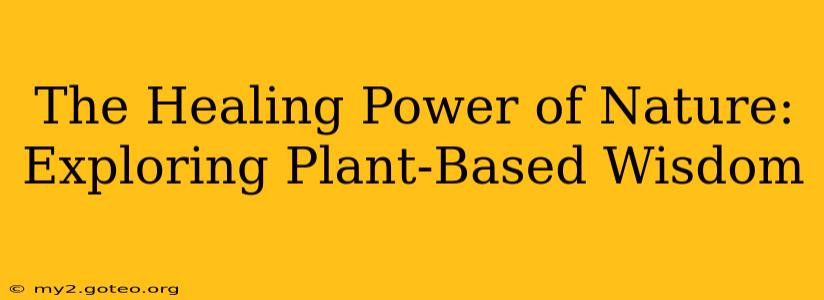For centuries, humans have turned to the natural world for healing. Long before the advent of modern medicine, plants provided remedies for a vast array of ailments. This deep-seated connection between humanity and the plant kingdom continues to resonate today, as we increasingly explore the therapeutic potential of plant-based medicines and practices. This exploration delves into the healing power of nature, examining the wisdom passed down through generations and the scientific evidence supporting the benefits of plant-based approaches to wellness.
What are some examples of plants used for medicinal purposes throughout history?
Throughout history, countless plants have played crucial roles in traditional medicine systems worldwide. Consider these examples:
- Willow bark: A source of salicylic acid, a precursor to aspirin, used for centuries to relieve pain and fever. Ancient civilizations, including the Egyptians and Greeks, understood its analgesic properties.
- Poppy: The opium poppy has been used for millennia as a potent pain reliever and sedative. While its use requires careful management due to its addictive properties, its historical significance in pain management is undeniable.
- Ginseng: This root, prized in traditional Chinese medicine, is believed to boost energy, improve cognitive function, and enhance overall well-being. Research continues to explore its potential health benefits.
- Chamomile: Known for its calming effects, chamomile tea has been a popular remedy for anxiety and sleeplessness for centuries. Its gentle nature makes it accessible to many.
- Aloe vera: This succulent plant has been used for centuries to treat burns, wounds, and skin irritations. Its soothing and regenerative properties are well-documented.
These are just a few examples highlighting the extensive historical use of plants for medicinal purposes. Each culture developed its own unique pharmacopoeia, reflecting the readily available flora in its region.
How can nature contribute to mental well-being?
Beyond the realm of physical healing, nature offers profound benefits for mental well-being. Spending time outdoors, engaging with nature, and even simply observing natural elements can significantly reduce stress and improve mood. This connection is supported by numerous studies showcasing the therapeutic effects of:
- Forest bathing (Shinrin-yoku): This Japanese practice involves immersing oneself in the forest atmosphere, engaging all senses to promote relaxation and reduce stress hormones.
- Gardening: The act of nurturing plants can be incredibly therapeutic, offering a sense of accomplishment and connection to the natural world.
- Nature walks: Even a short walk in a park or green space can significantly reduce stress levels and improve mood. Exposure to sunlight also helps regulate the body's circadian rhythm.
The restorative power of nature on mental health is increasingly recognized, leading to the integration of nature-based therapies into mental health treatment plans.
What are the benefits of aromatherapy using essential oils?
Aromatherapy, the therapeutic use of essential oils extracted from plants, offers a diverse range of benefits. The scents of these oils can influence the limbic system, the part of the brain responsible for emotions and memories, triggering a variety of physiological and psychological responses. Some commonly used essential oils and their purported benefits include:
- Lavender: Known for its calming and relaxing properties, often used to promote sleep and reduce anxiety.
- Rosemary: May improve cognitive function and memory.
- Peppermint: Can help alleviate headaches and improve focus.
- Tea tree: Possesses potent antiseptic and antimicrobial properties, often used topically for skin conditions.
It’s crucial to note that while aromatherapy can be a complementary therapy, it shouldn't replace conventional medical treatments. Always consult with a healthcare professional before using essential oils, especially if you have pre-existing health conditions.
Are there any risks or precautions associated with using plant-based remedies?
While plant-based remedies offer numerous benefits, it's crucial to be aware of potential risks and precautions:
- Allergic reactions: Some individuals may be allergic to certain plants or their extracts.
- Interactions with medications: Plant-based remedies can interact with prescription or over-the-counter medications.
- Dosage: Incorrect dosage can lead to adverse effects.
- Purity and quality: The purity and quality of plant-based products can vary significantly.
Always consult a qualified healthcare professional before using any plant-based remedy, especially if you are pregnant, breastfeeding, or have underlying health conditions. Purchase products from reputable sources to ensure quality and purity.
Conclusion:
The healing power of nature is a testament to the enduring wisdom passed down through generations and increasingly supported by scientific research. While plant-based remedies offer a rich array of potential benefits, responsible and informed use is crucial. By understanding the potential benefits and risks, and by seeking guidance from qualified healthcare professionals, we can harness the healing power of nature to enhance our well-being holistically. Remember, a balanced approach combining traditional wisdom with modern science offers the most comprehensive path to health and wellness.

